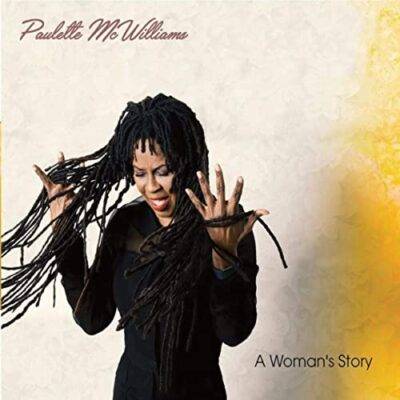Paulette McWilliams A Woman’s Story
A Woman’s Story
Blujazz
Chances are that you’ve heard Paulette McWilliams sing before. If you’ve heard Richard L’Hommedieu’s interview and/or seen the accompanying cover story (11/17/2020) you’re already aware of this but suffice it to say, McWilliams is the primary female voice on Michael Jackson’s “Don’t Stop ‘Til you Get Enough,” Aretha Franklin’s “Jump To It,” Billy Idol’s “Mony, Mony” and all kinds of hits for Luther Vandross. And she was lead singer for Quincy Jones on his “Body Heat” tour, has sung with Sarah Vaughan, and performed all the Tammi Terrell duets with Marvin Gaye on his last tour which was recorded live. This is only a snapshot. There is more in the cover story piece but how’s that for lineage? Yet maybe you’re asking whether an artist with such a pop and R&B resume has any cred in jazz. One listen to A Woman’s Story will affirmatively convince you.
McWilliams has drawn accolades from Cedar Walton, Terri Lyne Carrington, and others for her healthy jazz chops, an ability to sustain notes, deliver lyrics with impeccable phrasing, and a full round tone that at times evokes Sarah Vaughan or Nancy Wilson. Yet, the choices of songs here don’t so much conjure up jazz but the statement that “jazz is just a way of playing music.” Indeed, Williams transforms tunes from Janis Ian (“At Seventeen,” “Ruby”), Joni Mitchell (“Both Sides Now”), Kenny Rankin (“In the Name of Love”), and others into stunning vocal showcases. She doesn’t scat but instead marries her jazzy interpretations of folk/pop with those of the R&B/pop artists she has worked with – Marvin Gaye (“Just to Keep You Satisfied”), Donny Hathaway (“Chasing the Sun”), and Luther Vandross (“So Amazing”). She has a co-write with Tom Harrell (“Life Is the Fountain”) and her own “Where’s Home.” It’s an intoxicating mix driven not only by her velvet, crystalline tone, and remarkable vocal range but the work of her Grammy Award -winning producer Kamau Kenyatta, who has long been the producer for Gregory Porter.
“This record has been over 3 years in the making, and a good part of that time was spent selecting what to sing! I’m singing and interpreting songs we know and love, some written by special songwriters like Janis Ian, Lisa Sanders, and one of my favorite songwriters – Joni Mitchell.” says Paulette who in the `70s was the original lead singer of Rufus, preceding Chaka Khan ( yet another amazing part of her story).
The musicians here are also vital to this sound. Hugo Suarez’s elegant acoustic piano, as her main accompanist, impresses throughout with help from a select group including bassist Trevor Ware (Count Basie Orchestra, Kenny Burrell), drummer Terreon Gully (Christian McBride, Lauryn Hill), percussionist David Castaneda, and the “always brings the fire” harmonica of Grégoire Maret (“At Seventeen” and “Ruby”). A three-piece horn section of altoist Alex Budman (D’Angelo, Mavis Staples), tenorist Keith Fiddmont (Lionel Hampton, Billy Childs), and trumpeter Curtis Taylor (Patrice Rushen, Billy Childs) with Etienne Charles arranging grace several tracks. Background vocalists appear on “Never Letting Go” and “Let’s Go Out Tonight.”
As the title suggests, these are autobiographical introspections from a lady reflecting on her life and love lives with over 45 years in the music business. The generous, hour-long dozen songs contain several highlights, predictably surprisingly, her interpretation of Luther Vandross’ “So Amazing” by letting the background vocalists sit out while delivering that deep, take your time vibe that Luther had. Another is the Hathaway tune, “Chasing the Sun,” a killer love song imbued by Taylor’s trumpet solo. She delves into the nighttime bliss of romantic love on the Blue Nile’s “Let’s Go Out Tonight”
Her version of Marvin Gaye’s “Just to Keep You Satisfied” differs considerably from the original, taking the female’s point of view as a defiant ‘see you later” as opposed to Gaye’s ‘sorry to lose you’ stance. different from the original. On her version of “Never Letting Go” (made famous by Phoebe Snow), McWilliams & Kenyatta drop words, shorten choruses, and alter the song’s closing line altogether. And she slows down Kenny Rankin’s “In the Name of Love” which was originally done at a swinging tempo.
McWilliams seems intent on exploring all facets of love, taking Ian’s “At Seventeen” away from the being rejected in high school to her own sometimes parallel experience in the music biz, delivered in a confessional tone. This one and Ian’s “Ruby” feature the first call harmonicist of jazz, Grégoire Maret, who never fails to add special horn-like harmonic touches. As good as the aforementioned are, her closing selection, Joni Mitchell’s “Both Sides Now,” is a clinic in phrasing with the wise music veteran delving deep into a contemplative mode and ironically singing “I really don’t know life at all.” It’s a devastating take that merits many repeat listens
McWilliams’ storied history gives one the sense that she was never given full latitude on her recordings. You well may have heard her before, but you’ve never heard her make a statement like this.
Jim Hynes
Buy Us a Cup of Coffee!
Join the movement in supporting Making a Scene, the premier independent resource for both emerging musicians and the dedicated fans who champion them.
We showcase this vibrant community that celebrates the raw talent and creative spirit driving the music industry forward. From insightful articles and in-depth interviews to exclusive content and insider tips, Making a Scene empowers artists to thrive and fans to discover their next favorite sound.
Together, let’s amplify the voices of independent musicians and forge unforgettable connections through the power of music
Make a one-time donation
Make a monthly donation
Make a yearly donation
Buy us a cup of Coffee!
Or enter a custom amount
Your contribution is appreciated.
Your contribution is appreciated.
Your contribution is appreciated.
DonateDonate monthlyDonate yearlyYou can donate directly through Paypal!
Subscribe to Our Newsletter
Discover more from Making A Scene!
Subscribe to get the latest posts sent to your email.














































